The soldiers of the 1st Brigade of the Polish Legions fought for the freedom of the homeland. But is it all? Among them there were also those like the one who enlisted in the military to avoid responsibility for a triple murder. And he got out of the punishment without any problem
We go back to 1915. To March 27, to be exact. Czestochowa. The two-story Glatter tenement house at 14 Krakowska Street.
In a poorly furnished apartment on the first floor, the bodies of three people lie in pools of blood:25-year-old Józefa Goździkowa and her two children, aged 9 and 7. In the room, between the couch and the table, there is a woman in a white bathrobe. On the left side of the neck you can see a deep r a cut, almost separating the head from the torso .
In the bedroom, however, it is much worse. Right at the entrance lies the body of 7-year-old Zenek stretched backwards. Two meters away, closer to the window is his older brother Bogumił. Also dead. The boys have massacred heads.
There is a militia at the crime scene (Częstochowa units of the People's Militia of the Polish Socialist Party will not be established until November 1918). In her apartment, she finds a razor with which the murderer cut the throat of Goździkowa, and an ax with which he killed the woman's sons with a dozen or so blows. There are no major problems with finding a suspect in a triple crime. A neighbor named Ogórkowska saw a man at Goździkowa several times in the days leading up to the murder. For the last time yesterday.
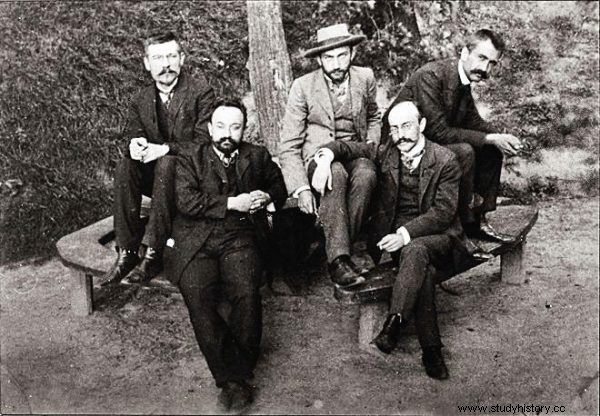
After disarming the occupiers and taking control of Radom, the Polish Socialist Party established the first units of the People's Militia. In the following days, new ones were created, among others in Częstochowa, Warsaw and Łódź. At the beginning of December 1918, the People's Militia of the PPS numbered about 6,000 people. The photo shows PPS activists before 1905.
Youthful Beast
The trail leads to the nearby Fabryczna Street. In one of the houses there is a shop on the ground floor. The owners, Wawrzyniec and Marianna Dudek, are wealthy people. They have an 18-year-old son. Two years ago, Władysław, a middle school student in Częstochowa, met - who lived almost vis a vis store - Józefa Goździkowa. He fell in love with her almost immediately, starting regular intimate visits to his neighbor.
The relationship of the son with a woman several years older, a mother of two children, who earned a living as a prostitute, was certainly not to the liking of Władysław's parents. The boy, however, insisted, "this or none."
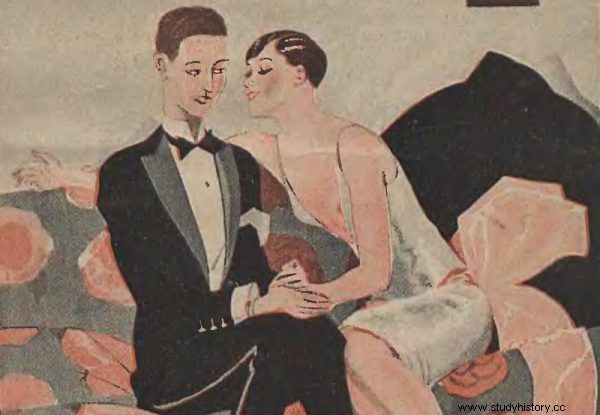
No wonder that Władysław Dudek's parents were not satisfied with his relationship with his neighbor. Not only was she much older than him, but she also earned her living as a prostitute.
Unfortunately, the thing is that after a few months, "this" was fed up with the amors of the inexperienced young man who repeatedly accused her of being unfaithful. So she decided to break up with him. Władysław Dudek's visits to Goździkowa started to end in increasingly sharp quarrels.
Neighbor Ogórkowska saw the boy with the girl on the eve of the crime. Other residents of the Glatter house remembered a young man dressed in a fashionable English overcoat walking around near the tenement house shortly before the discovery of the tragedy. The observations of the witnesses spoke for themselves. It was also assumed that the second motive of the crime, apart from revenge, was the desire for profit. Ogórkowska stated that a bag had been stolen from the apartment, in which Goździkowa kept larger sums of money she had deposited.
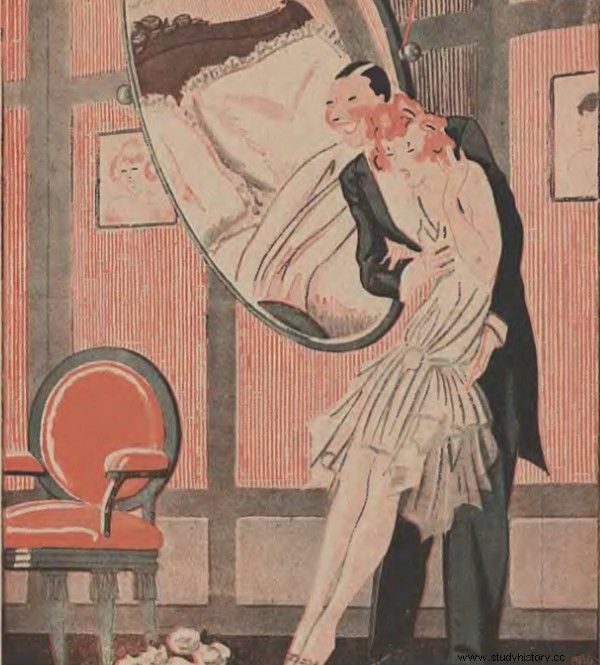
There were more and more frequent quarrels between Goździkowa and Dudek. Was the woman bored with the young lover?
Władysław Dudek did not stay at home that night. He escaped from Częstochowa and his traces were lost.
In war, like in war
The money taken on the road was quickly exhausted. So Dudek decided to enlist in the army. In the spring of 1915, the 1st Brigade of the Polish Legions, operating as part of the 1st Corps of the Austrian 1st Army of General Wiktor Dankel, conducted position fights with the Russians on the Nida River. New "cannon fodder" was still needed. Assembly stations, i.e. recruitment points for legionnaires, were established in the territory of the Kingdom of Poland, including in Lublin and Jędrzejów. Most likely, Władysław Dudek found his way to one of them. He was enlisted in the army and soon sent to the front.
In the summer months, the soldiers of the 1st Brigade, after crossing the Vistula line, fought victorious fights, among others, at Kraśnik and Jastków. On July 30, they were greeted by enthusiastic crowds of Lublin residents. It is possible that among the legionaries who were cheered and waved from balconies with handkerchiefs, there was a beastly killer of three.
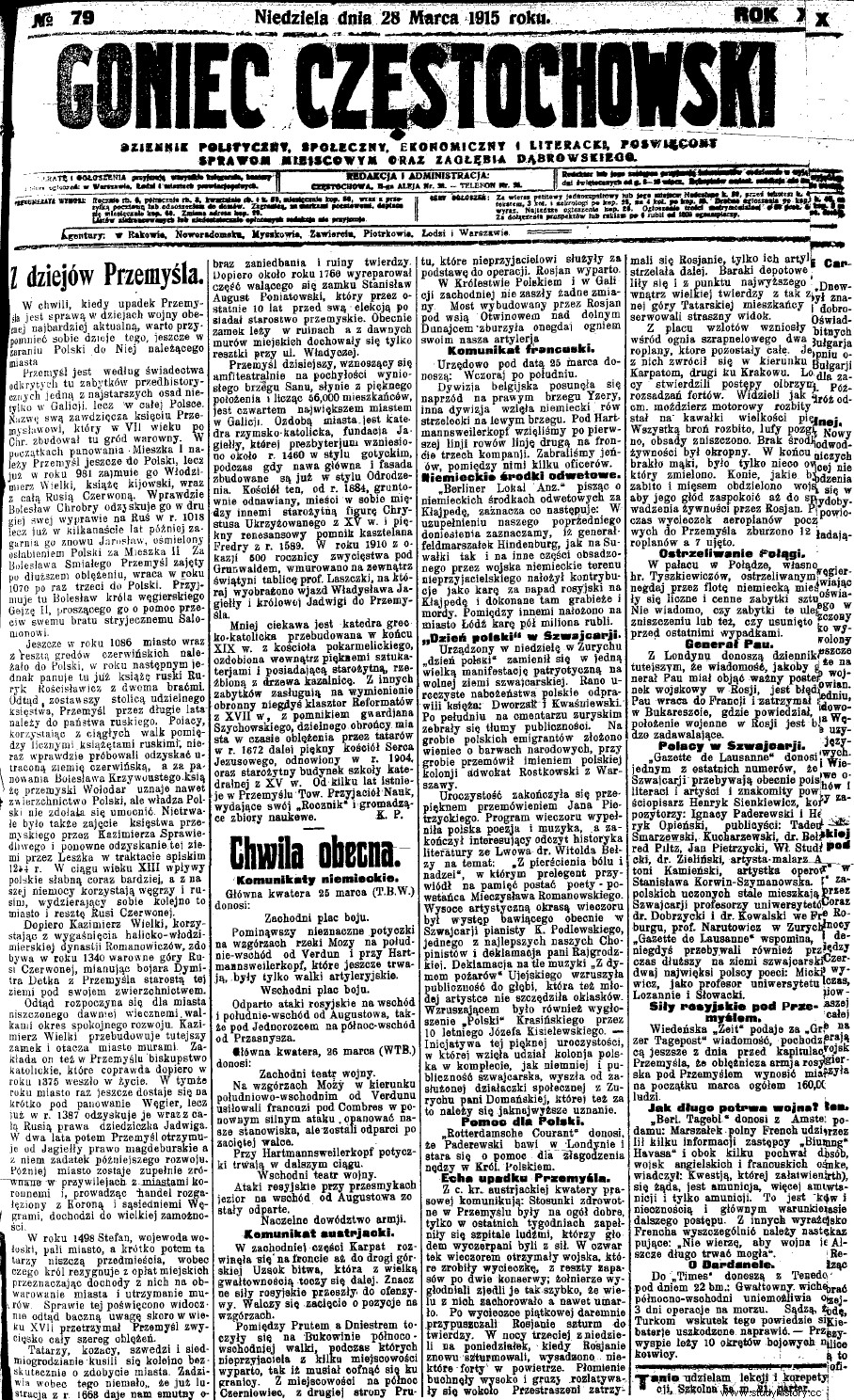
One of the sources of the article is the "Archive of New Records" printed in issue 79 of "Goniec Częstochowski" from 1915.
It is not known what soldier he was. In the preserved documents, there is no mention of Dudek's insubordination or cowardly behavior. It must therefore be assumed that during his military service he did not do anything unworthy of a legionnaire.
One day in April 1916, however, Dudek was recognized. He was then in Volhynia with the army. On the charge of triple murder, he was taken to a military detention facility in Lublin, from where he was then sent to the German District Court in Częstochowa .
German courts, like Austrian courts, were known for their strictness. The murderers were often sentenced to the gallows. And such a fate would probably have happened to Władysław Dudek, had it not been for the fact that at the time he committed the crime, the Russian penal code was still in force in the Kingdom of Poland, prohibiting the use of the death penalty. And since the law is not retroactive, on June 23, 1916, Dudek was sentenced to life imprisonment.
Merciful Piłsudski:donate the rest!
Władysław's parents began looking for a way to ease the punishment. The first opportunity arose in 1919. The verdict of the German court was most likely based on the premise that Dudek acted out of profit, as evidenced by the alleged theft of money belonging to the murdered. But apart from her neighbor, Ogórkowska, no one has confirmed it. The proceedings were resumed. In view of the doubts as to the motive of the murder, the court in Częstochowa reduced Władysław Dudek's sentence to 15 years' imprisonment.
Although the sentence was reduced, Dudek still had 12 years of imprisonment. So the parents made a new effort to get their son out of prison. In 1921, they asked the Chief of State, Józef Piłsudski, to pardon Władysław.
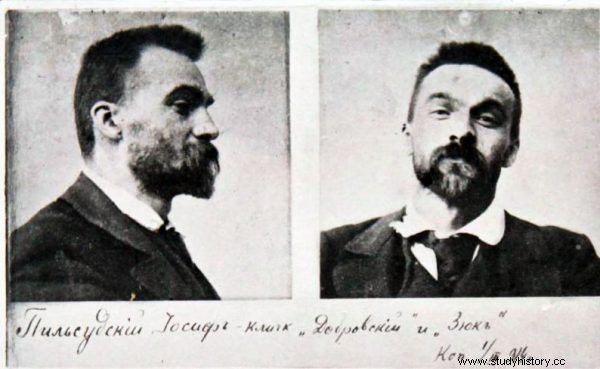
Piłsudski after he was arrested by Ochrana in 1900. Maybe it was this experience that made him pardon the criminals without thinking?
They were not the only ones who looked for help from him. After Poland regained independence, everything that came from the institutions administered by the invaders was repeatedly criticized and subjected to searches. Among other things, court judgments in criminal matters. The Ministry of Justice and the Chief's office were inundated with requests to pardon those sentenced by the Russian, German and Austrian courts. Many, but not all, of the applications have been approved.
Piłsudski himself had a fairly light hand for pardon. Of course, when he was in a good mood. He once saved a murderer Gołasiówna from Lublin from bullets from a firing squad. The second time, he received a request for pardon on March 19. Apparently, he didn't want any blood on his hands on his name day.
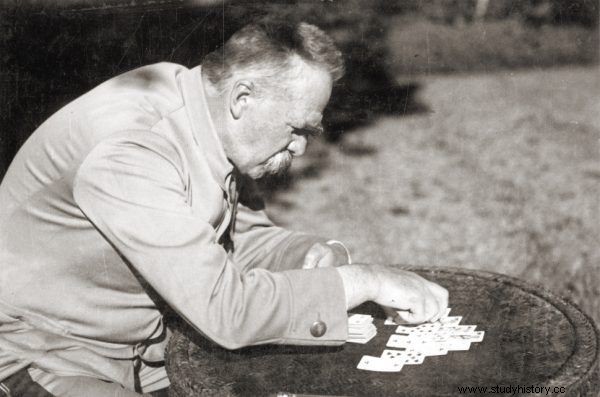
One of the Marshal's favorite pastimes was playing solitaire. I wonder if he used cards when he handled requests for pardon.
He showed pity for the former subordinate from the 1st Brigade. He decided that 5 years in prison is enough for a young man who is mad with passion. "Forgive the rest" - the marshal hurriedly crossed out with an indistinct typeface at the Minister of Justice's request to pardon Dudek. The letter was received by him on July 29, 1921. Were there more criminals hiding among the Legionnaires? Perhaps. But they could count on Piłsudski's "gracious".
